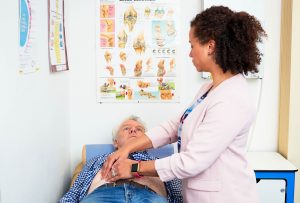Examining methodology to identify patterns of consulting in primary care for different groups of patients before a diagnosis of cancer: a matched retrospective cohort study
Start Date Apr 2020
Code E18-C
Status Completed
Introduction
 There are indications that multi-morbidity may affect diagnostic timelines for cancer. However, establishing diagnostic timelines with a degree of certainty may be difficult as a recent study regarding lung cancer suggests that the first symptoms patients visit their GP with may not actually be caused by cancer in up to half of patients. Misattribution of symptoms to cancer may affect the accuracy of diagnostic timelines. This may be especially relevant for patients with chronic disease, particularly where symptoms of conditions and cancer overlap. New methods that are independent of this source of uncertainty are needed for accurate estimates of the timeliness of cancer diagnosis, and to understand the impact of pre-existing chronic conditions on the diagnostic process.
There are indications that multi-morbidity may affect diagnostic timelines for cancer. However, establishing diagnostic timelines with a degree of certainty may be difficult as a recent study regarding lung cancer suggests that the first symptoms patients visit their GP with may not actually be caused by cancer in up to half of patients. Misattribution of symptoms to cancer may affect the accuracy of diagnostic timelines. This may be especially relevant for patients with chronic disease, particularly where symptoms of conditions and cancer overlap. New methods that are independent of this source of uncertainty are needed for accurate estimates of the timeliness of cancer diagnosis, and to understand the impact of pre-existing chronic conditions on the diagnostic process.
Some studies have been trying to investigate diagnostic timelines using patients’ consultation rates. It appears that patients visit their GP more often before they are diagnosed with cancer. By taking into account varying base consultation rates due to multi-morbidity and other patient characteristics, it should be possible to reliably indicate any change in consultation rates due to cancer. With this study we aim to explore whether this method can be used to establish the diagnostic timeliness reliably for patients with different multi-morbidity burdens.
Aims & objectives
The aim of this study is to examine methodology that is suitable for identifying patterns of consulting in primary care for groups of patients with differing levels of multi-morbidity before a diagnosis of cancer.
Objective 1: Identify when primary care consultation rates increase before a cancer diagnosis.
Objective 2: Compare the time between the start of the increase in consultation rates and cancer diagnosis for patients with different multi-morbidity burdens.
Methodology
The study uses primary care data from the Clinical Practice Research Datalink (CPRD). We will study patients aged 40 years or older with a CPRD recording of oesophageal or stomach cancer between 1 January 2010 and 31 December 2019. To quantify baseline consultation rates, controls matched (1:1) to cases on age, sex, general practice, and multi-morbidity burden will be included.
We aim to develop methodology, based on time series and negative binomial/Poisson regression, to explore how the timeliness of cancer diagnosis varies between groups of patients with different multi-morbidity burden. Previous work using such techniques concentrated on the point at which the difference between consultation rates in cases and controls becomes statistically significant. This potentially introduces a bias according to sample size. Here we will build on preliminary work being done in partnership between Gary Abel and the UCL CanTest team to estimate the most likely inflection point and the uncertainty on that.
Outputs & impact
This study will be a useful step in building knowledge in how first presentation to primary care for patients with multimorbidity could more accurately be identified. If successful, the methodology could be used in future work in order to contribute to new understanding regarding how multimorbidity may affect recognition, investigation and diagnosis of cancer in primary care.


